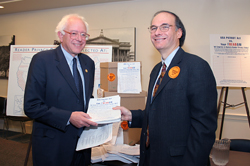- Categories:
Reader Privacy Petitions Presented to Congress
 |
|
Some of the thousands of petitions collected by ABA-member booksellers.
|
On Wednesday, September 29, the Campaign for Reader Privacy (CRP) petition drive culminated with a press conference on Capitol Hill in Washington, D.C., as representatives of the four sponsoring organizations presented to Congress petitions containing nearly 200,000 signatures.
ABA COO Oren Teicher; Salman Rushdie, president of PEN American Center; Pat Schroeder, president of the Association of American Publishers (AAP); and Carla Hayden, past president of the American Library Association, personally handed Rep. Bernie Sanders (I-VT) petitions bearing 9,000 signatures collected in his home state of Vermont. Also in attendance to accept the petitions was Rep. Barbara Lee (D-CA). The bulk of the thousands of signed petitions were delivered to Sanders prior to the presentation.
"These four organizations have been leaders in drawing attention to Section 215 of the Patriot Act and its dangerous implications for civil liberties in our country," said Sanders, who opened the press conference. He noted that, while terrorism is "serious business" and that governments around the world must do everything that they can to protect citizens from terrorist attacks, "we ... must fight terrorism without undermining the basic principles and constitutional rights [that] make us a free country. We do not need legislation such as Section 215 of the Patriot Act, which allows government agents access to the files of America's libraries and bookstores without probable cause."
 |
|
Holding petitions are (l. to r.) Carla Hayden, past president of the American Library Association; Salman Rushdie, president of PEN American Center; Pat Schroeder, president of the Association of American Publishers; and Oren Teicher, COO of the American Booksellers Association.
|
 |
|
(L. to r.) Carla Hayden, Rep. Barbara Lee, Rep. Bernie Sanders, Pat Schroeder, Oren Teicher, and Salman Rushdie at the CRP press conference.
|
 |
|
Rep. Bernie Sanders (left) and Oren Teicher. All photos above: |
Sanders continued, "One of the exhilarating aspects of this whole struggle against Section 215 of the USA Patriot Act has been the massive amount of grassroots activity that is taking place. And I should add here that this opposition is coming from across the political spectrum -- from progressives, conservatives, and many in-between....
"Today is the culmination of months and months of work by numerous organizations to draw attention to potential civil liberties violations as a result of the Patriot Act."
Following Sanders' comments, Rep. Lee spoke, followed by remarks by Teicher (who spoke in lieu of ABA President Mitchell Kaplan, who could not make the presentation due to a travel delay), Hayden, Schroeder, and Rushdie.
Teicher said, "I stand here as the representative of more than 500 booksellers around the country who started circulating petitions in February calling on Congress to restore the protections for the privacy of bookstore and library records that were eliminated by the USA Patriot Act. With our partners in [CRP], we have collected nearly 200,000 signatures, and we are here today to present them to our champion, Congressman Bernie Sanders, and the other Congressional leaders of the fight for reader privacy. We chose this day in particular because it falls during Banned Books Week, the national celebration of the freedom to read….
"To be clear -- we do not claim any absolute right to privacy ... we recognize that there may be unusual circumstances when appropriate law enforcement authorities may be able to convince a court of law to issue a search warrant to a bookstore or library. But Section 215 eliminates all of the procedural safeguards that currently protect bookstore and library privacy.
 |
|
ABA COO Oren Teicher Photo credit: Focused Images Photography, Inc.
|
"Concerned about these limitations and mindful of … various attempts to seek bookstore records, booksellers overcame whatever reluctance they felt and put out the reader privacy petitions. They were astonished by the response of their customers. People rushed to sign the petitions and thanked booksellers for giving them the opportunity to express themselves. Some booksellers who displayed the petitions in their front windows found that people were coming in just to sign their names."
Teicher concluded, "It is not just booksellers, librarians, publishers, and writers that are urging Congress to restore the protections for reader privacy -- the readers of America are demanding the right to read freely."
In her comments, ALA's Hayden recalled a phone call from U.S. Attorney General John Ashcroft. "During our conversation, Mr. Ashcroft assured me that the Justice Department had not used the powers granted to it under the USA Patriot Act to investigate libraries. But months after my conversation with Mr. Ashcroft, we learned that the Justice Department used its power to snoop on library users just weeks after our conversation. The Justice Department has continually refused to tell the public how many library patrons it has investigated since the Patriot Act was passed." In conclusion, Hayden noted, "We want to spread the word that it is patriotic to question the USA Patriot Act."
AAP's Schroeder, a former congresswoman herself, noted that fears of government snooping are well-founded, and she gave as examples domestic spying on civil rights and Vietnam war protest groups and the FBI's Cold War-era "Library Awareness Program." Schroeder posed the question: How long will the free marketplace of ideas survive in an atmosphere "where readers are afraid to read and publishers are reluctant to publish controversial books with unpopular views that may bring them under unwanted government scrutiny?"
PEN's Rushdie is well aware of this issue. "In 1989, Ayatollah Khomeini of Iran issued a 'fatwa' on my life … for my novel, The Satanic Verses," Rushdie said. "In several countries, those who published this novel suffered boycotts and violent retribution. Many countries still forbid the reading and mere possession of my books….
"As an organization that has grappled with the impact of terrorism on freedom of expression and the right to write in many countries, our position is clear: PEN deplores terrorism and supports strong, targeted laws to confront this threat and prevent terrorist attacks. But PEN has also grappled with the impact of anti-terror and national security measures. We have witnessed how in many countries … anti-terror laws exceeded their stated purpose and came to be used to consolidate power, cover government misconduct, and stifle dissent."
Rushdie continued, "Several measures enacted in the U.S. since September 11, 2001, including the USA Patriot Act, contain elements that compromise core American values and put our country on shaky ground internationally."
The groups stressed that, while the presentation of signed petitions culminated this particular phase of CRP, they pledged to Sanders and other members of Congress that they would continue to support their efforts to amend Section 215.
The CRP press conference will be aired on Book-TV on C-SPAN2 on Saturday, October 2, at 12:00 noon and on Sunday, October 3, at 8:30 a.m. ET. --David Grogan

